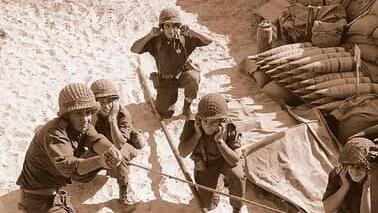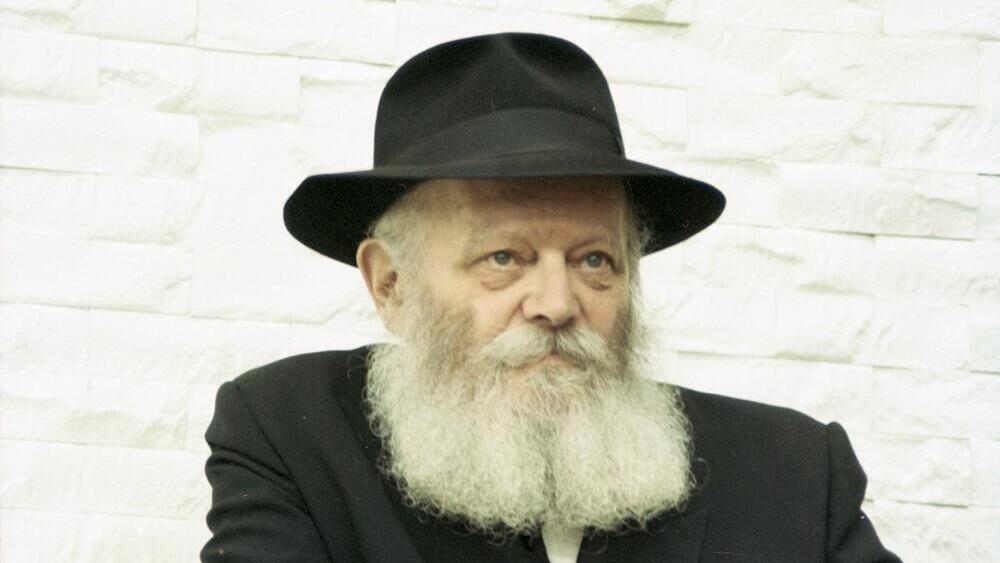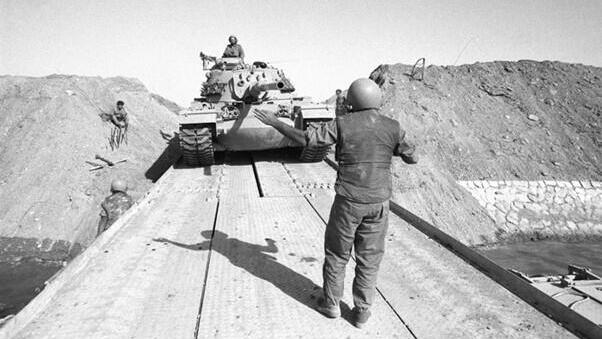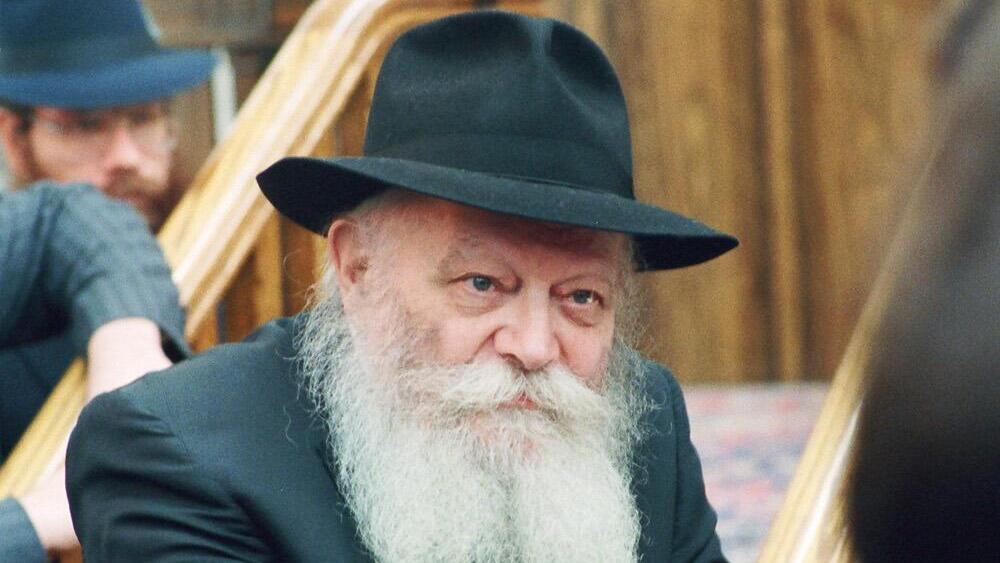Israeli society has belatedly recognized Maj. Gen. (res.) Yitzhak Brik as a “prophet of wrath” for his warnings about our impending disaster which remained tragically unheeded. Today his words light up social networks, the very media who just weeks ago scorned his doomsday predictions line up for a chance to interview him, and the country’s decision-makers consult him about Israel’s next steps.
More stories:
This brings to mind the many pain-filled forewarnings of the Rebbe, Rabbi Menachem Mendel Schneerson, who for four decades exhorted Israel to correct a series of dangerous policies and misconceptions, warning that they’d metastasize to invite terror and bloodshed on an incalculable scale. So crystal clear was his analysis and foresight that anyone familiar with it was tragically not entirely surprised by the Oct. 7 catastrophe.
Since the war’s onset, Jewish Educational Media (JEM) has been releasing archival videos of the Rebbe, speaking about the Land and People of Israel. In these public addresses, the Rebbe prescribes with impeccable clarity the practical steps Israel must take to ensure the safety and security of its millions of residents, while warning of the grave danger inherent in certain widespread misconceptions.
Topics range from military strategy and specific weaponry to how to most effectively boost morale and fighting spirit; from ceasefires and hostages to the behind-the-scenes mindset of American strategists; from how and by whom is security strategy to be formed to tutorials on the mindsets of terrorists and the Arab street.
In addition to his public teachings, the Rebbe’s door was famously open to Israel's leaders, who would journey to his modest office in the heart of Brooklyn (known as “770”) seeking his loving, visionary, and practical advice for weighty matters of state.
The Rebbe was apprised in real time of Israel's most sensitive and classified discussions, while being intimately aware of the rhythm and minutiae of Israeli life. Responding to his distinguished guests’ urgent challenges, the Rebbe would often conduct an eye-opening reassessment of their quandaries — helping them to reframe many issues and emerge with a refreshingly new and logical perspective, empowered with highly grounded and practical action plans.
Yet, despite guiding Israel successfully through many of its challenges in education, security, economy, industry, arms procurement, and countless other weighty matters; and even though many individual pieces of his strategic security advice were implemented by Israeli leaders in both wartime and in peace; the Rebbe remained perpetually pained and even frightened for Israel’s safety and wellbeing, because of a leadership mindset and behaviors that he assessed directly invite more terrorism and bloodshed.
During the War of Attrition, while the Nixon administration was investing considerable effort into negotiating a ceasefire between Israel and Egypt, the Rebbe warned of the dangers acceding to a ceasefire, tactically, operationally, and strategically. It would reinforce the new perception of Israel as weak and malleable, further erode its deterrent power, and invite a new war.
Egypt’s primary interest in a cease-fire is to safely gain an advantageous position for its next war against Israel, the Rebbe asserted. “Even before the ink dries on the agreement Egypt will violate the ceasefire terms,” he warned. “Who knows how many lives will be lost in the next war because of this?!”
Indeed, on the very day the cease-fire went into effect, the Egyptians began brazenly violating its terms by installing advanced surface-to-air missile batteries near the Suez Canal, never looking back until it became the world’s biggest anti-aircraft installation. Upon launching the Yom Kippur War, the Egyptians activated these systems to take out numerous Israeli aircraft and neutralize Israel’s air force from providing air cover to Israel’s canal strongholds, which resulted in extraordinary Israeli casualties. (The Rebbe’s warnings about the dangerous futility of the vaunted Bar Lev line were similarly ignored, further compounding the calamity of those early hours.)
Describing the Rebbe’s insight into military matters, Yom Kippur War hero and Medal of Valor recipient Moshe Levy said, “He didn't speak like a rabbi; he spoke like a general.”
4 View gallery


IDF forces in the War of Attrition
(Photo: The IDFA and Defense Establishment Archive)
In the summer of 1973, while Israeli leaders boasted that the Suez Canal was quieter than the French Riviera, the Rebbe urgently requested that children from all over Israel gather at the Western Wall for critical prayers that G-d “silence the enemy and avenger” (Psalms, 8:3), and he quietly but firmly convinced retired and retiring IDF generals with ‘67 war experience under their belt to urgently re-enter the IDF because their experience will be “critically necessary... in the upcoming war.”
As to Golda and Dayan’s fear of upending world opinion by striking preemptively, or even by mobilizing the reserves, the Rebbe was beside himself as he cried out that instead of saving countless lives by acting upon our millennia-old moral imperative to preempt those who come to kill us, the cowardice of but a few forced many thousands to join the tragic ranks of Israeli widows and orphans.
When after a miraculous comeback from its numerous self-inflicted wounds in that war Israel was on the outskirts of Damascus, the Rebbe pleaded with Dayan to occupy the capital city, even for a short time.
The Rebbe explained that the bold symbolism alone would foster immense respect and lasting deterrence on the Arab street, which could be immediately and easily leveraged into a real peace and cessation of bloodshed on both sides, for many decades to follow. His repeated attempts to convince Dayan fell on deaf ears; he was simply too weak and afraid. The Rebbe painfully forewarned that this was “a grave mistake."
When in the 1982 Lebanon War, Israel began squandering its priceless military momentum because of world opinion, the Rebbe pointed to the many soldiers who had sacrificed their lives to finally achieve proper security, explained that America has little respect for pushovers, and repeatedly insisted that Israel’s safety demands that it “finish what it started.”
After the IDF imposed a siege on Beirut and was finally on the brink of eliminating Arafat’s bloodthirsty terrorists, Menachem Begin once again succumbed to pressure and allowed the terrorists to be “exiled” instead to Tunis. Decrying the danger this weakness invites, the Rebbe said that everyone understands that this is only a face-saving ruse and that they’d soon return much reinforced to terrorize the Israeli populace. Not only does this weakness render future rounds of fighting inevitable, it also ensures that they’ll be conducted under significant disadvantage to Israel, and will extract much higher prices in bloodshed on both sides! (This decision, too, has since cost us many thousands of casualties.)
“The Rebbe had a clear vision,” about how to ensure Israel’s safety, said former Mossad head Efraim Halevy, “and he never abandoned it for a moment. Even when no one was willing to listen.”
On one occasion when there appeared to be no chance that our leaders would heed his warnings about danger he saw vividly before his eyes, the Rebbe could no longer contain himself. With bitter tears pouring down his face for the avoidable bloodshed to come, he invoked the words of Isaiah (50:2) from the Haftorah of that Shabbat and cried: “...Why is it that I cry out and no one answers?!”
Yet, despite the constant and seemingly futile uphill battle, the Rebbe never stopped explaining and exhorting, alarming and pleading. Emphasizing that no effort may be spared if even only a remote possibility exists to save lives, the Rebbe shared his hopeful optimism that “by continuing undeterred to cry out and implore, again and again, one day it will finally penetrate and Israel will finally reorder its priorities to establish as its number one priority the safety of its citizens, Jews and non-Jews.”
 Moni Ender
Moni EnderPerhaps this counterintuitive optimism was connected to the Rebbe’s vision of our core unity with one another, our shared destiny, and the tangibly transcendent oneness of our souls. The Rebbe believed that we are a Holy People living in a Holy Land, gifted to us by G-d. He would regularly invoke biblical passages about G-d’s miraculous protection of the Land of Israel, its People and its soldiers — who put their own lives on the line to protect others — as abject reality. Even in the face of the dire consequences of human error that he warned about, the Rebbe still repeatedly invoked a special safety inherent in the Land of Israel, and prayed for miraculous minimization of (even) said losses. Indeed, his blessings and his singular voice of steadfast assurance of miraculous victory uplifted and accompanied countless Israeli soldiers into battle during the Six Day and Yom Kippur Wars, and calmed and assured Israel’s citizens during many other challenging times, such as the Gulf War.
Some of the Rebbe’s tear-drenched warnings manifested into tragic reality on Simchat Torah. And some of his optimistic vision of our unity has since manifest widely, too. Perhaps our leaders will now finally justify his long-ago optimism that they’d correct course and turn his crystal clear vision of our homeland’s security into a reality?
After experiencing such heavy casualties of life on October 7, will they finally listen?
Can they afford not to?
- Moni Ender is the spokesperson of Chabad Youth Organization.
First published: 19:34, 11.17.23





